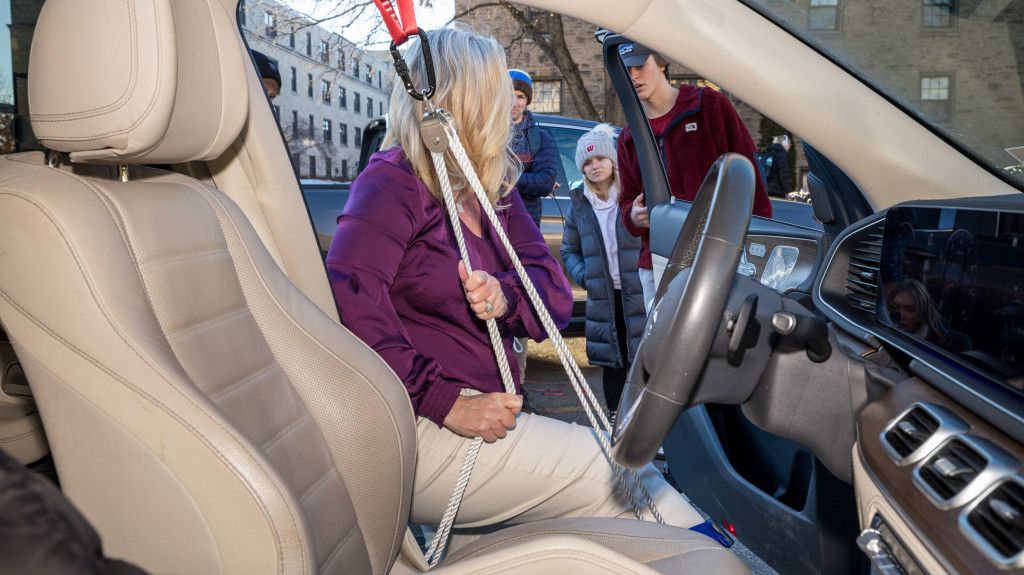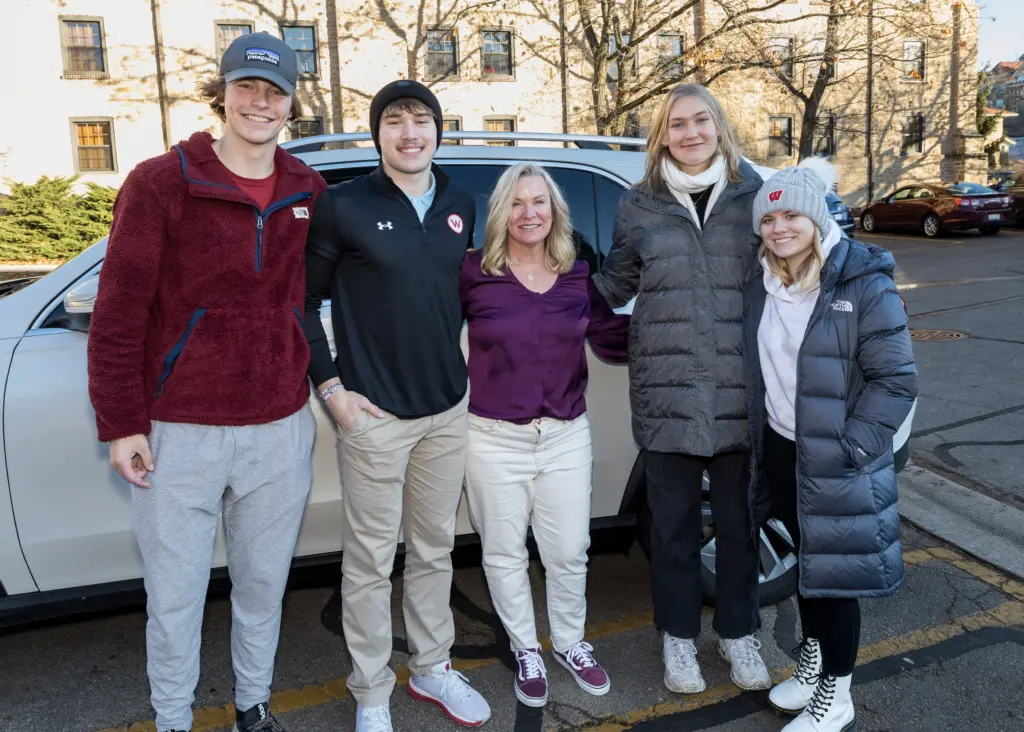First-year UW–Madison engineers create solution that empowers woman with MS

Waunakee resident Kristan Collins uses a device designed by UW–Madison first-year engineering students that helps her get into her vehicle. The students designed the system for Collins, who lives with multiple sclerosis, during a design course taught by Tracy Puccinelli. Photo by Joel Hallberg, UW–Madison
WAUNAKEE – A sense of dread washes over Kristan Collins just about every day when it comes time to run errands. It’s not that she doesn’t enjoy trips to stores like Homegoods, and she loves driving her 2020 Mercedes-Benz GLE 350 — her first non-utilitarian vehicle since the mother of four became an empty nester.
The root of her anxiety is the seemingly simple task of getting behind the wheel.
“Getting into a car seems like a mindless activity, but for me, it’s a big challenge,” says Collins, a 57-year-old resident of Waunakee, who lives with multiple sclerosis that limits her ability to lift her right leg higher than 3 inches off the ground. “I really have to hold onto the car with both hands and launch myself into the driver seat.”
A team of first-year engineering students at the University of Wisconsin–Madison is creating a device to alleviate that worry for Collins. The students’ project is part of INTEREGR 170, an interdisciplinary, introductory design course that’s open to first-year students in the College of Engineering. Each semester, groups of students develop prototypes to address challenges for real clients, often local community members like Collins contending with health challenges.
Biomedical engineering majors Luke Schmeling of Holmen, Ilia Mikhailenko of Mequon, Sydney Smith of Sheboygan, Lauren Piper of Eagle River and Lucas Cramer of Rochester, Minn., have fashioned a removable traction pulley system that attaches to Collins’ car and helps her lift her right foot high enough to enter the vehicle smoothly and safely.
“I think we all came in with the preconceived notion that we wouldn’t be doing anything real-world until maybe our junior or senior year,” says Schmeling. “This makes the engineering feel a lot more real, a lot faster.”
Collins connected with Assistant Teaching Professor Tracy Puccinelli, who created the course, through her neurologist, Dr. Chris Luzzio.
Luzzio, a professor in the School of Medicine and Public Health, has also taught several engineering courses throughout his time at UW–Madison and has referred a handful of clients to Puccinelli’s course over the years.
In the course, students set about exploring solutions and incorporating advice and feedback from professional engineers who volunteer their time. The group working with Collins received advice from alumnus Scott Schulz, a lead system designer at GE Healthcare. They met virtually with Collins, using communication skills that Puccinelli is keen to instill in them, along with teamwork, self-awareness and technical acumen, to better understand their client’s problem. The team then created a decision matrix to weigh competing factors like ease of entry, cost and safety, before presenting three ideas to Collins in mid-October.
She was wowed.
“It’s hard to believe that these students are only freshmen,” says Collins, a two-time UW–Madison graduate. “I would have expected this from seniors. But they really make me feel like they’re doing this for me, not a grade!”
In the end, the students, with Collins’ endorsement, opted for the simplest and most adaptable design. Their pulley system consists of a foot loop, rope, pulley and carabiner. It won out over a collapsible seat that would slide toward the driver’s seat — à la a rowing machine — and a pneumatic balloon.
Collins, who was diagnosed with MS at age 31 during a pregnancy, is hopeful the design could be a prototype for a broader-reaching solution for older adults and others with medical conditions that affect mobility. She’s planning to refer a friend to Puccinelli for a future project — giving another set of budding engineers a chance to build their skills while helping someone in the process.
“It’s not just for our grade — it’s actually going to help somebody with their life,” says Mikhailenko. “It’s additional incentive to make it as good as we possibly can.”
Do you know someone who might benefit from an INTEREGR 170 student design project? Submit a project request here: https://engineering.wisc.edu/departments/biomedical-engineering/about/freshmen-engineering-projects/

From left: Lucas Cramer, Luke Schmelling, Kristan Collins, Lauren Piper and Sydney Smith. Photo by Joel Hallberg
Enjoy this story?
Read more news from the College of EngineeringTags: College of Engineering, outreach
